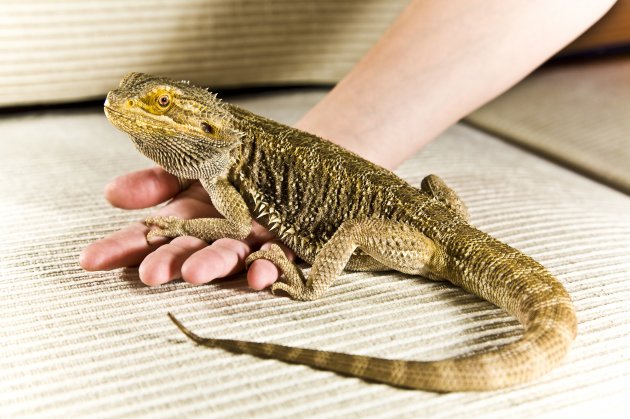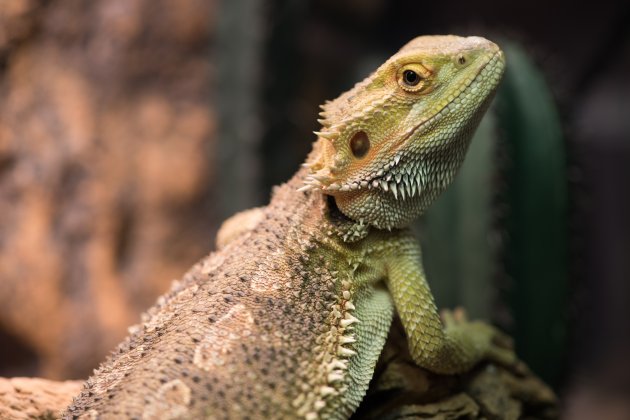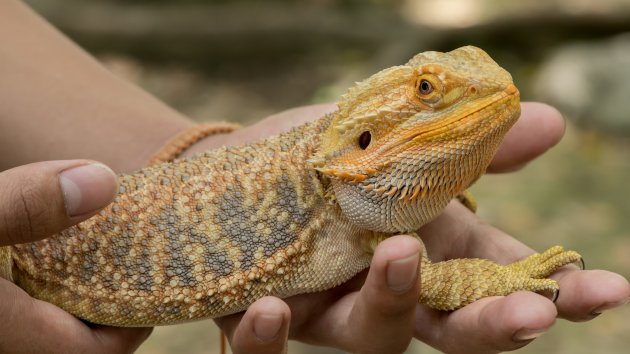While bearded dragons are one of the hardiest reptile species, they can also get very sick if they are not taking care of properly. Before getting your first bearded dragon, make sure to do the proper research on the type of enclosure that is needed and look for an exotic veterinarian who can treat your bearded dragon if they ever get sick. These are some of the most common health problems seen in bearded dragons. If your bearded dragon seems ill, take them to your exotic veterinarian; as the earlier the treatment is started, usually the better the outcome.

Metabolic Bone Disease
Metabolic Bone Disease is very commonly seen in Bearded Dragons who are not kept in an ideal habitat. Since they are housed indoors, you must supplement them with the proper housing and lighting that they would find in nature. Metabolic Bone Disease is caused by low levels of calcium and Vitamin D3 in the body. Signs of metabolic bone disease in your bearded dragon are:
- Swollen legs
- Easily broken legs
- Deformed body
- Twitchy movements
- Not eating
- Weight loss
If you notice any of these signs, take your bearded dragon to your veterinarian. They can take x-rays to see how brittle your bearded dragons’ bones are and get them to start on a calcium supplement.
Preventing Metabolic Bone Disease
There are many things that you can do to prevent your dragon from getting metabolic bone disease. These are easy things that you can do at home to make sure that your bearded dragon never suffers from this disease
- Feed green leaf lettuce. This is high in calcium and helps supplement your bearded dragon with a great source of calcium.
- Sprinkle calcium on crickets. Most people feed crickets or other insects to their bearded dragons. When feeding insects, cover them with calcium-rich powder that can be purchased at any pet store selling bearded dragon supplies. This will also help add calcium to your bearded dragons' diet.
- Provide an adequate heat source. Bearded dragons need a source of heat for their bodies to be able to process the calcium. Make sure that you have a hot side of the cage and cooler side.
- Have UVA and UVB light. Bearded dragons need UVB to help process calcium. Make sure that the lights that you use emit at least 10 to 12% of UVB light. The UVB levels will decrease after about 6 months. It is best to change those lights every 6 months, even if they are still working.
Bearded dragons who suffer from metabolic bone disease can sometimes fully recover. Sometimes the deformities are too severe for them to return to completely normal. Supplementing their diet with calcium will help prevent them from getting worse and get them back to a healthy life.

Mouth Rot
Mouth rot is an infection and inflammation in your bearded dragon's mouth. This infection is caused from your bearded dragon being stressed. Common signs seen with mouth rot are:
- Redness and bleeding in the mouth
- Swollen jaw with pus
- The skin of the lips peeling
- Not eating
If you notice any of these signs in your bearded dragon, take them to the veterinarian. To treat mouth rot in bearded dragons, your veterinarian will possibly take a culture from the mouth to help determine what type of antibiotic will treat the infection. Your veterinarian will use a mouth wash, antibiotic injections, and topical creams to help clear the infection. Sometimes it can take a few weeks for the infection to clear up, and for your bearded dragon to return to their normal selves.
During this time, your bearded dragon will need help with eating and drinking. Syringe feeding food and water will help keep your bearded dragon healthy.
Impaction
Impactions are seen in bearded dragons who are housed on a sandy substrate. Unfortunately, sand is commonly sold at pet stores to keep in your bearded dragon’s cage. It is much better to use a substrate that cannot be easily eaten. Signs that your bearded dragon may have an impaction are:
- Not pooping for a few days
- Lack of appetite
- Foreign material in poop
- Struggling to poop
If you notice any of these signs, take your bearded dragon to the veterinarian. They will usually start by soaking your bearded dragon in warm water and gently massaging their belly. You can try this at home before bringing them to the vet. If your bearded dragon does not poop after soaking, your veterinarian can give your bearded dragon medication to help increase GI motility or an enema.
Retained Shed (Dysecdysis)
As your bearded dragon grows, they will shed their skin like what snakes do. This is more common in younger bearded dragons as they are continually growing. If bearded dragons are not kept in ideal temperature and humidity levels, they may have a hard time shedding. Their shed commonly gets stuck on their feet, eyes, and tail but can get suck anywhere on their body.
If you notice that your bearded dragon has old skin stuck on them, it is best to soak them in warm, not hot water. This will help loosen the skin and allow it to come off easier. When peeling the retained shed off, especially around the eyes, be very careful as you can damage the surface of the eye.

Conclusion
Bearded dragons are great pets for people who are new to reptile care and husbandry. By interacting with your bearded dragon daily, you will notice when they are sick. The earlier you start treatment on bearded dragons, the better the outcome.
Further reading:
- VeterinaryPartner. Brad Lock, DVM, DACZM. Fungal Disease (Yellow Fungus Disease) in Bearded Dragons
- S. Schmidt-Ukaj, M. Hochleithner, B. Richter, C. Hochleithner, D. Brandstetter, Z. Knotek. A survey of diseases in captive bearded dragons
- Kevin Wright, DVM. Constipation in Bearded Dragons
- Dysecdysis